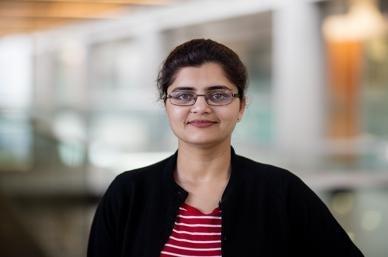A new study, led by Apoorva Chauhan, a postdoctoral researcher at the Cheriton School of Computer Science, found that in evaluating the trustworthiness of social media accounts named after crisis events, people sometimes pay attention to the page’s profile picture, name, the number of followers it has, and spelling and grammatical errors.
“Some of these things can be easily spoofed,” said Dr. Chauhan. “People need to think beyond things that can be easily manipulated and look at the authenticity of the source of information.”
Chauhan believes the findings of this study are also applicable to the COVID-19 pandemic, as there are a lot of social media accounts named after the pandemic, where people are sharing information and crisis support.
“With the COVID-19 pandemic, a lot of people have created CNRs [crisis named resources] on Facebook and Twitter and are again sharing news, facts, memes, etc.,” said Dr. Chauhan. “Some of what is being shared is inconsequential, but for those who are sharing news, it’s very important to know who these people are, who gave them the authority to share news, and why should we listen to them. In many instances, there are no names, no faces, no organization, so there’s nobody to hold accountable for misinformation.”
In undertaking the study, the researchers conducted 17 interviews and 105 surveys with members of the public and experts in crisis informatics, emergency response, and communication studies to evaluate the trustworthiness of crisis named resources — termed after the 2017 Hurricane Irma.
The researchers found that people evaluate trustworthiness based on their perceptions of a CNR’s content, information source, profile and owner. The study also uncovered that if people perceive that a CNR owner has prior experience in crisis response, can help the public to respond to the event, understands the situation, has the best interests of affected individuals in mind, or will correct misinformation, they tend to trust that CNR.
The study, titled Trustworthiness perceptions of social media resources named after a crisis event, conducted by Dr. Apoorva Chauhan of the Cheriton School of Computer Science and Assistant Professor Amanda Lee Hughes of Brigham Young University, was recently published in the Proceedings of the ACM on Human-Computer Interaction.

Apoorva Chauhan is a postdoctoral researcher in the David R. Cheriton School of Computer Science. She graduated with PhD in Computer Science in July 2019 from Utah State University (USU). Her research excellence has been recognized at USU with three prestigious awards: Outstanding Graduate Researcher in the Computer Science Department (2018), Doctoral Researcher of the Year in the USU College of Engineering (2018), and Outstanding Graduate Scholar in the USU College of Engineering (2018).